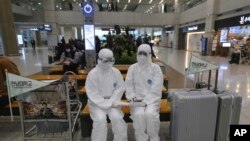In a nation where education is among the most competitive and high-pressure in the world — where classes have been conducted in monsoons or snowstorms — the South Korean government has postponed school.
Universities are quiet and mostly empty as teaching has been moved online to avoid students sharing infectious coughs and sneezes in the classroom. All secondary-, middle- and primary schools that were scheduled to open late February or early March remain closed.
This is a first in South Korean history, according to the Ministry of Education and Korean news outlets.
“In the case of my school, we already started our semester and are taking classes online,” Sooyoun Kim, a student at George Mason University’s campus in South Korea, said. “But we keep extending our face-to-face classes.”
Frustrated students
Students say they are frustrated with online learning and that the delays have a downside.
“I’m an accounting student and I like to actually have a professor teach me rather than me teach myself accounting. So it is really inconvenient,” said Alexa Bituin, an American student studying in South Korea. “I get to sleep-in more, and I have more free time to do stuff, but it is better to do face to face.”
Sejin Kim, a Korean student enrolled at Nankai University in China, has been unable to return to university for almost a month because of travel restrictions, but is continuing her education online. Classes were supposed to resume Feb. 17 in person.
“It was really difficult in the beginning because the website crashed often, and it was especially hard for international students like me, because the connection would cut off,” Kim said. “But now they’ve fixed it and it’s going well.”
While returning university students see this as an inconvenience in their academic career, many college freshmen say they are disappointed in this initial college experience.
Hyori Yoon is a freshman at the University of Utah in Salt Lake City, studying at its Songdo campus about 30 minutes from Incheon International Airport. Her first year in university is not what she expected, she said.
“I had this wish to finally hang out with friends and go to all these places before college started, but now all of that has gone up in the air. I can’t tick anything off on my bucket list before I attend college, so I even feel a sense of loss and emptiness,” she said. “I can’t help but feel like this is so unfair. Also, I feel like all of my college expenses, such as the tuition fee and dorm room fee, is going to waste.”
Study-abroad students
In addition to domestic students, study-abroad students in Korea have been affected by COVID-19.
“It’s totally understandable, but it has been a little frustrating to just sit around and do nothing,” said Matthew Mandell, an American student studying abroad on the Incheon campus of George Mason University, whose main campus is in Virginia.
Mandell said he’s a bit worried he won’t be able to return to the U.S. for a while, but regardless, he’s planning to stay.
“I’m not too worried about my personal health because as a young adult in good health, I know my immune system is probably strong enough that even if I was contaminated, I would be OK,” he said.
“There is a very, very small fear of being ‘trapped’ in Korea,” he added, “but I think I will be OK.”
Danielle Cova, an American student who planned to stay in South Korea to finish her spring semester at George Mason University’s extended campus, decided to go back to the United States and instead take summer courses to finish her studies.
“Unfortunately, I dropped my courses and went back home,” she said. “I will have to take 12 credits over the summer just to catch up and not fall behind on my graduation date.”
“I was stuck in between losing a semester or worrying about my health. I put my health above my studies for obvious reasons,” Cova said.
Nico Zviovich contributed to this report.







